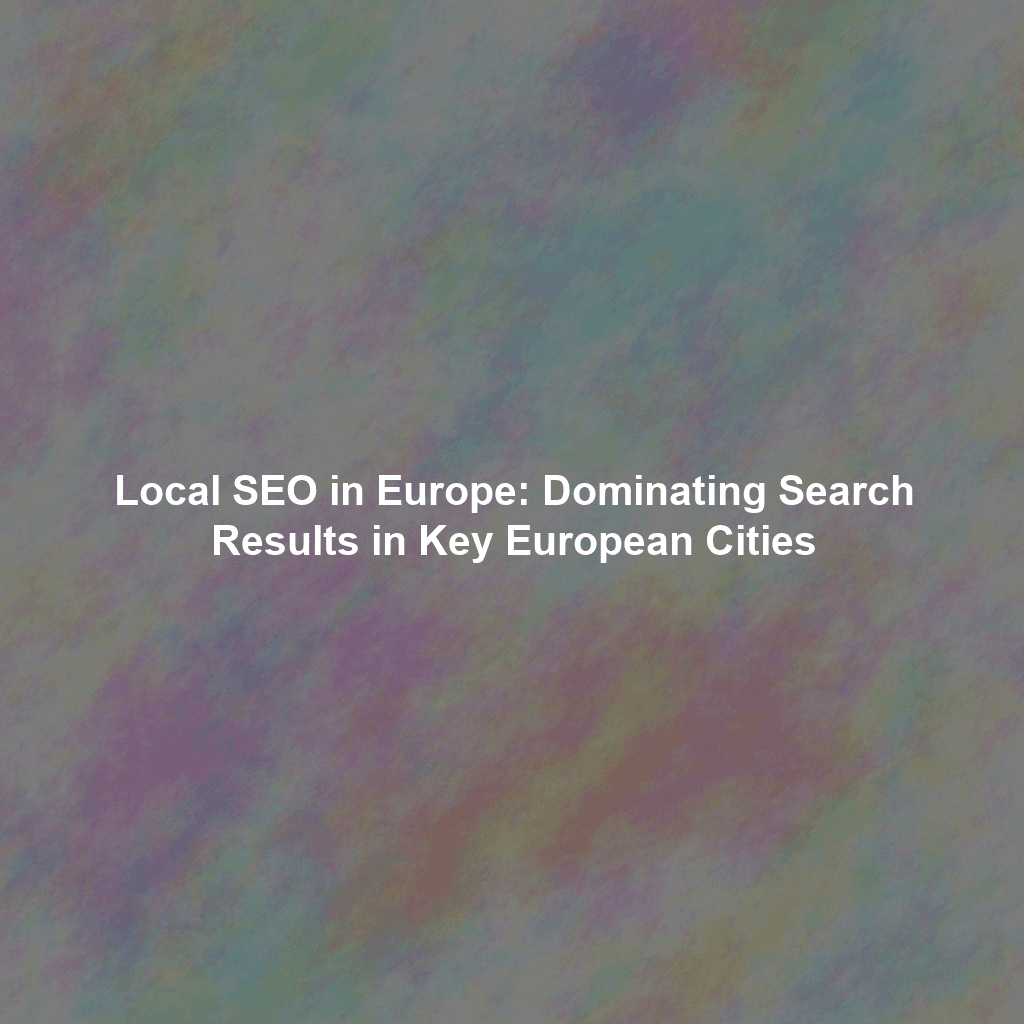Understanding the European Local Search Landscape
Before diving into specific tactics, it’s crucial to understand the nuances of the European search landscape. While Google holds a dominant position in most European countries, alternative search engines like Yandex (popular in Russia) and Seznam (prominent in the Czech Republic) cannot be ignored, especially if you’re targeting those specific markets. Furthermore, Google itself often displays different search results based on the user’s location and language settings.
Language is Key: The Foundation of European Local SEO
Europe’s multilingual nature requires a comprehensive, language-aware SEO strategy. Simply translating your website isn’t enough. You need to:
- Optimize Google My Business (GMB) profiles in multiple languages: Create separate listings for each language, ensuring consistent information across all profiles. Pay close attention to translating descriptions, categories, and service offerings accurately.
- Conduct keyword research in each target language: Direct translations of English keywords may not always be the most effective. Use native keyword research tools and techniques to identify the terms that your target audience actually uses.
- Localize your website content: Beyond basic translation, consider cultural nuances and adapt your content to resonate with the local audience. This includes adjusting pricing, currency, and even the tone of your writing.
Advanced Local SEO Techniques for European Cities
Once you’ve established a solid multilingual foundation, you can implement these advanced techniques to further boost your local SEO performance:
Mastering Google My Business (GMB) in Europe
Your GMB profile is often the first impression potential customers have of your business. Maximizing its effectiveness is crucial. Here’s how:
- Claim and Verify Your Listing: Ensure your GMB listing is claimed and verified for each location you serve.
- Complete Every Section: Fill out every section of your GMB profile meticulously, including business hours, address, phone number, website URL, and attributes.
- Use High-Quality Photos and Videos: Showcase your business with professional photos and videos that highlight your products, services, and team.
- Encourage and Respond to Reviews: Actively solicit reviews from satisfied customers and respond to all reviews, both positive and negative, in a timely and professional manner. In several European countries, it’s legally necessary to have explicit consent before requesting reviews. Be sure to check regulations in the target country.
- Utilize GMB Posts: Regularly publish posts to announce special offers, events, and new products or services.
- Leverage GMB Q&A: Monitor the Q&A section and answer questions promptly and accurately. This is a great opportunity to address common concerns and provide helpful information.
Leveraging Local Citations for European Cities
Local citations are online mentions of your business name, address, and phone number (NAP). They are a crucial ranking factor for local SEO. Focus on:
- Building Citations on Relevant Local Directories: Identify and list your business on prominent local directories in each target city. Think Yelp, local business directories, and industry-specific directories.
- Ensuring NAP Consistency: Maintain consistent NAP information across all online platforms. Even slight variations can negatively impact your SEO.
- Monitoring Citation Accuracy: Regularly audit your citations to identify and correct any inaccuracies.
- Leveraging Industry-Specific Citations: If you’re a restaurant, claim your profiles on sites like TripAdvisor, OpenTable, and local food blogs.
Hyper-Local Keyword Targeting: Getting Specific
General keywords are highly competitive. Focus on targeting location-specific keywords that are relevant to your business. For example, instead of targeting “Italian restaurant,” target “Italian restaurant in [Specific Neighborhood], Paris.”
- Use Location Modifiers: Incorporate city names, neighborhoods, and landmarks into your keywords.
- Target Long-Tail Keywords: Focus on longer, more specific keyword phrases that reflect user intent. For example, “best vegan pizza near Eiffel Tower” is a long-tail keyword.
- Analyze Competitor Keywords: Identify the keywords that your competitors are targeting and look for opportunities to outrank them.
Local Link Building: Building Authority in European Cities
Earning backlinks from reputable local websites is essential for building authority and improving your search rankings. Focus on:
- Partnering with Local Businesses: Collaborate with other local businesses on cross-promotional campaigns and link exchanges.
- Sponsoring Local Events: Sponsor local events and charities to gain backlinks and build brand awareness.
- Creating Local Content: Publish blog posts and articles that are relevant to the local community. For example, write about local events, landmarks, or history.
- Guest Blogging on Local Websites: Contribute guest posts to relevant local blogs and websites.
Mobile Optimization: Critical for European Users
Mobile internet usage is exceptionally high throughout Europe. Ensuring your website is fully optimized for mobile devices is crucial.
- Responsive Website Design: Ensure your website is responsive and adapts seamlessly to different screen sizes.
- Fast Loading Speed: Optimize your website for fast loading speed, as mobile users are less patient with slow-loading websites.
- Easy Navigation: Make it easy for mobile users to navigate your website and find the information they need.
- Click-to-Call Functionality: Implement click-to-call functionality to make it easy for mobile users to contact you directly.
Measuring and Analyzing Your Local SEO Performance
Tracking your progress and analyzing your results is essential for optimizing your local SEO strategy. Use tools like Google Analytics and Google Search Console to monitor your website traffic, keyword rankings, and other key metrics. Also, monitor your GMB insights regularly to see what keywords are driving views to your profile and actions taken.
By consistently monitoring your performance, you can identify areas for improvement and refine your strategy to achieve optimal results.
Conclusion: A Tailored Approach to European Local SEO
Local SEO in Europe is a multifaceted endeavor that requires a deep understanding of the local market, language, and culture. By implementing these advanced techniques and tailoring your strategy to specific European cities, you can significantly improve your local search rankings, attract more customers, and ultimately grow your business. Remember to consistently monitor your performance and adapt your strategy as needed to stay ahead of the curve in the ever-evolving world of SEO. The key is to think locally, act locally, and optimize globally.
 Skip to content
Skip to content

